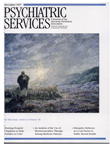Innovative Idea
Beginning in 1995 the Department of Veterans Affairs Medical Center in St. Louis began developing a psychological-social rehabilitation program for patients with chronic mental illness that is centered on time-limited therapeutic groups. The groups consist of a series of 50-minute sessions held for a period of eight weeks. Participants select the number of sessions per week they wish to attend. Topics addressed include budgeting, communications and feelings, community resources, empowerment, life challenges, medication, nutrition, symptom management and relapse prevention, and self-evaluation of progress.
Each group meeting is attended by six to ten outpatients with a wide range of diagnoses. The program is organized to accept stable individuals, those with subacute conditions, and those in transition from hospital stays; at present it does not accommodate persons with severe organic syndromes or violent acting out.
The groups are designed to empower consumers by giving them more responsibility for their own progress and familiarizing them with the idea that the benefits of treatment are proportionate to the effort expended. Participants are encouraged to become involved in selecting and implementing the learning tools used by the group. Groups have built-in evaluations of the presenter and the presentation and are continually implementing appropriate suggestions. Groups that provide education and support for patients' significant others are also available. The program has an interdisciplinary staff that draws on the talents of paraprofessional as well as professional staff. (Edwyna M. Towler, clinical social work diplomate, Department of Veterans Affairs Medical Center, St. Louis, Missouri 63125)



